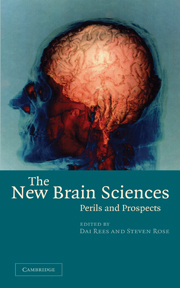Book contents
- Frontmatter
- Contents
- List of contributors
- Part I Introduction: the new brain sciences
- Part II Freedom to change
- 1 Do we ever really act?
- 2 The definition of human nature
- 3 Consciousness and the limits of neurobiology
- 4 Mind metaphors, neurosciences and ethics
- 5 Genetic and generic determinism: a new threat to free will?
- Part III Neuroscience and the law
- Part IV Stewardship of the new brain sciences
- Part V Conclusion
- References
- Index
5 - Genetic and generic determinism: a new threat to free will?
Published online by Cambridge University Press: 08 August 2009
- Frontmatter
- Contents
- List of contributors
- Part I Introduction: the new brain sciences
- Part II Freedom to change
- 1 Do we ever really act?
- 2 The definition of human nature
- 3 Consciousness and the limits of neurobiology
- 4 Mind metaphors, neurosciences and ethics
- 5 Genetic and generic determinism: a new threat to free will?
- Part III Neuroscience and the law
- Part IV Stewardship of the new brain sciences
- Part V Conclusion
- References
- Index
Summary
We are discovering more and more about human genotypes and about the connections between genotype and behaviour. Do these advances in genetic information threaten our free will? This chapter offers a philosopher's perspective on the question.
Whether or not genetic discoveries do really threaten free will, many feel threatened, and it is not difficult to see why. If genetic advances enable us to predict with increasing accuracy and reliability what people will do, this seems to undermine the pretensions of individual autonomy and agency. In what sense do I choose for myself what I do, if you can say reliably in advance what that choice will be?
The free will dilemma is a hardy philosophical perennial. After thousands of years of work there is still no generally accepted solution, no clear demonstration that free will really is possible. A philosopher may well wonder how new genetic knowledge could make things any worse, or indeed make things any different.
The sceptical dilemma and diminished responsibility
To see why a philosopher might suspect that genetic information could not possibly make the problem of free will any worse than it already is, we need to consider the classic free will dilemma, an argument with three very plausible premises and a depressing conclusion. First, everything that happens in the world is either determined or not. Second, if everything is determined, there is no free will.
- Type
- Chapter
- Information
- The New Brain SciencesPerils and Prospects, pp. 88 - 100Publisher: Cambridge University PressPrint publication year: 2004
- 1
- Cited by



